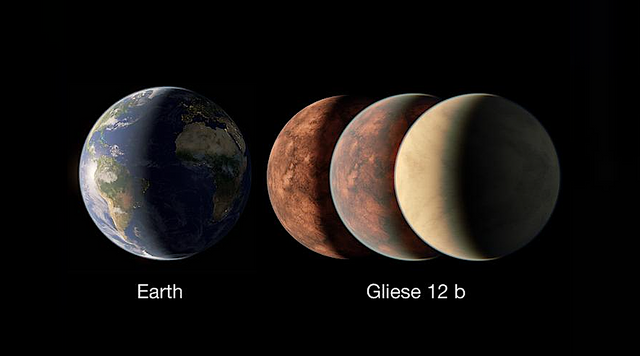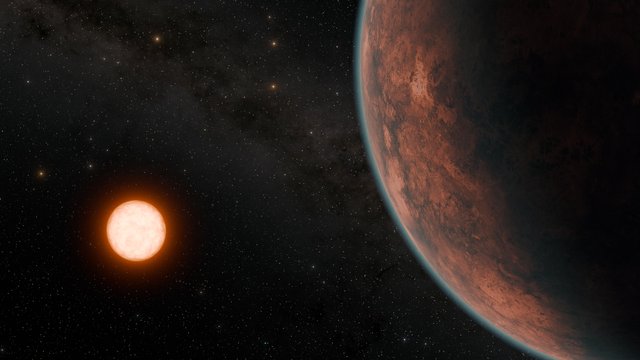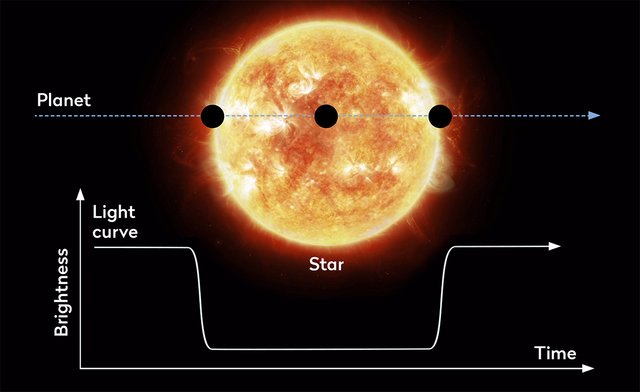Gliese 12 b, an Earth-like exoplanet/Gliese 12 b, un exoplaneta similar a la Tierra

Source
As you all probably already know, we call any planet that revolves around a star other than our Sun an exoplanet. In 1995 the first of them was discovered and to date more than five thousand of these exoplanets have been discovered, with the most varied and strange characteristics that you can imagine.
Como seguramente todos ya sabéis, llamamos exoplaneta a cualquier planeta que gire alrededor de una estrella que no sea nuestro Sol, en el año 1995 se descubrió el primero de ellos y a día de hoy ya se han descubierto más de cinco mil de estos exoplanetas, con las características más variopintas y extrañas que os podáis imaginar.
Beyond the fascination that all of them produce in us, the ones that interest us the most are those that most resemble our native Earth, that is, those that, due to their size and their location in relation to the star they orbit, allow us to find water in a liquid state and of which there are already about twenty candidates.
Más allá de la fascinación que nos producen todos ellos, los que más nos interesan son aquellos que más se parecen a nuestra Tierra natal, es decir, aquellos que por su tamaño y su situación en relación a la estrella a la que orbita permiten que en su superficie se pueda encontrar agua en estado líquido, de los que ya existen unos veinte candidatos.

Source
Now the Royal Astronomical Society announced the discovery of an exoplanet similar to Earth that is "only" 40 light years away, which they have named Gliese 12b and that orbits a red dwarf star in the constellation of Pisces, which is twenty-seven percent the size of the Sun and sixty percent its temperature.
Ahora la Real Sociedad Astronómica anunció el descubrimiento de un exoplaneta similar a la Tierra que está a "tan solo" 40 años luz de distancia, al que han denominado Gliese 12b y que orbita en torno a una estrella enana roja en la constelación de Piscis, que tiene un veintisiete por ciento del tamaño del Sol y un sesenta por ciento de su temperatura.
This star has been discovered thanks to the "transit method", which consists of detecting an object by the fall in the brightness of a star while a planet crosses in front of it, to give you an idea of how difficult this is, a planet like Earth when it crosses the Sun causes a 0.01% decrease in brightness, something like a grain of sand passing through a bright spotlight.
Este astro ha sido descubierto gracias al "método de tránsito", que consiste en detectar un objeto por la caída del brillo de una estrella mientras un planeta cruza por delante de ella, para que os hagáis una idea de lo difícil que es esto, un planeta como la Tierra cuando cruza el Sol provoca una disminución del 0,01% del brillo, algo así como un grano de arena atravesando un foco brillante.

Source
Although Gliese 12 b is not the first of these characteristics to be discovered, this one seems to promise more, with a temperature of about forty-two degrees Celsius on its surface that, in our case, we would still need a fan, but it is a good temperature to keep water in a liquid state which would facilitate the existence of life.
Aunque Gliese 12 b no es es primero de estas características que se descubre, este parece que promete más, con una temperatura de unos cuarenta y dos grados centígrados en su superficie que, en nuestro caso, igual necesitaríamos un abanico, pero es una buena temperatura para mantener el agua en estado líquido lo que facilitaría la existencia de vida.
In any case, as I have mentioned, this exoplanet is "only" forty light years away, which means that just a couple of messages to meet for coffee with a "Gliesean" would take us eighty years to agree on, so If any of you were thinking about moving to Gliese to avoid paying taxes on Steem's profits, you're going to have a pretty difficult time.
De cualquier forma, como he comentado, este exoplaneta esta "tan solo" a cuarenta años luz, eso implica que tan solo un par de mensajes para quedar a tomar un café con un "Glieseano" nos llevaría ochenta años para ponernos de acuerdo, así que si alguno estabais pensando en mudaros a Gliese para no pagar impuestos por las ganancias de Steem lo tenéis bastante difícil.
More information/Más información
https://astrobiology.com/2024/05/gliese-12-b-a-potentially-habitable-exo-venus-with-earth-like-temperature.html
¡Ja! ¡Ja! A cuarenta años luz, tal vez me siga el SC01 en Steemit. Allí no llegaremos nunca a menos que nazca otro Einstein que termine de aclarar el espacio tiempo, agujeros negros, etc. a ver si se puede tomar tal atajo para tomar un café.
¡Saludos y feliz día!
Congratulations, your post has been upvoted by @dsc-r2cornell, which is the curating account for @R2cornell's Discord Community.
Wow quiet really interesting that such update can really come up in this our present age. This is really awesome
"In any case, as I have mentioned, this exoplanet is "only" forty light years away, which means that just a couple of messages to meet for coffee with a "Gliesean" would take us eighty years to agree on, so if any of you were thinking about moving to Gliese to avoid paying taxes on Steem's profits, you're going to have a pretty difficult time."
You mean over 40 years ago, wow that is really so massive
This is really quite an interesting facts I was able to learn today and thank you so much for sharing this information
It is really quite astonishing that the world of science keeps coming up with strange discovering every single time